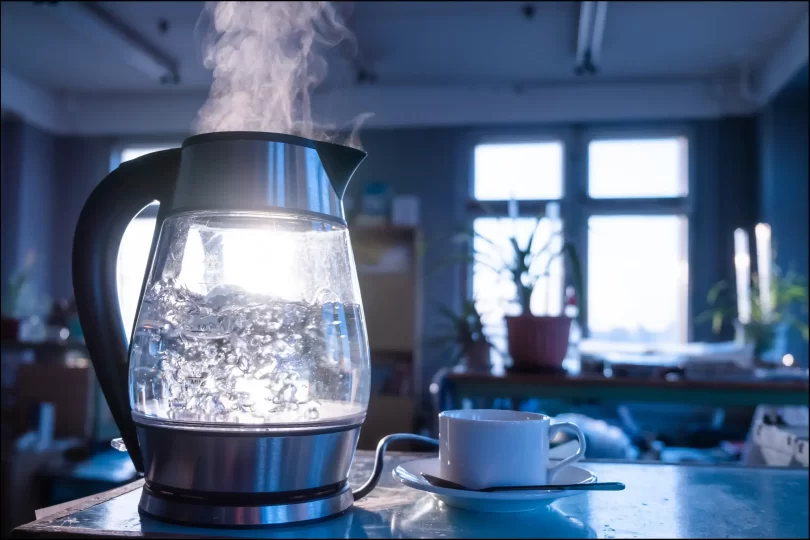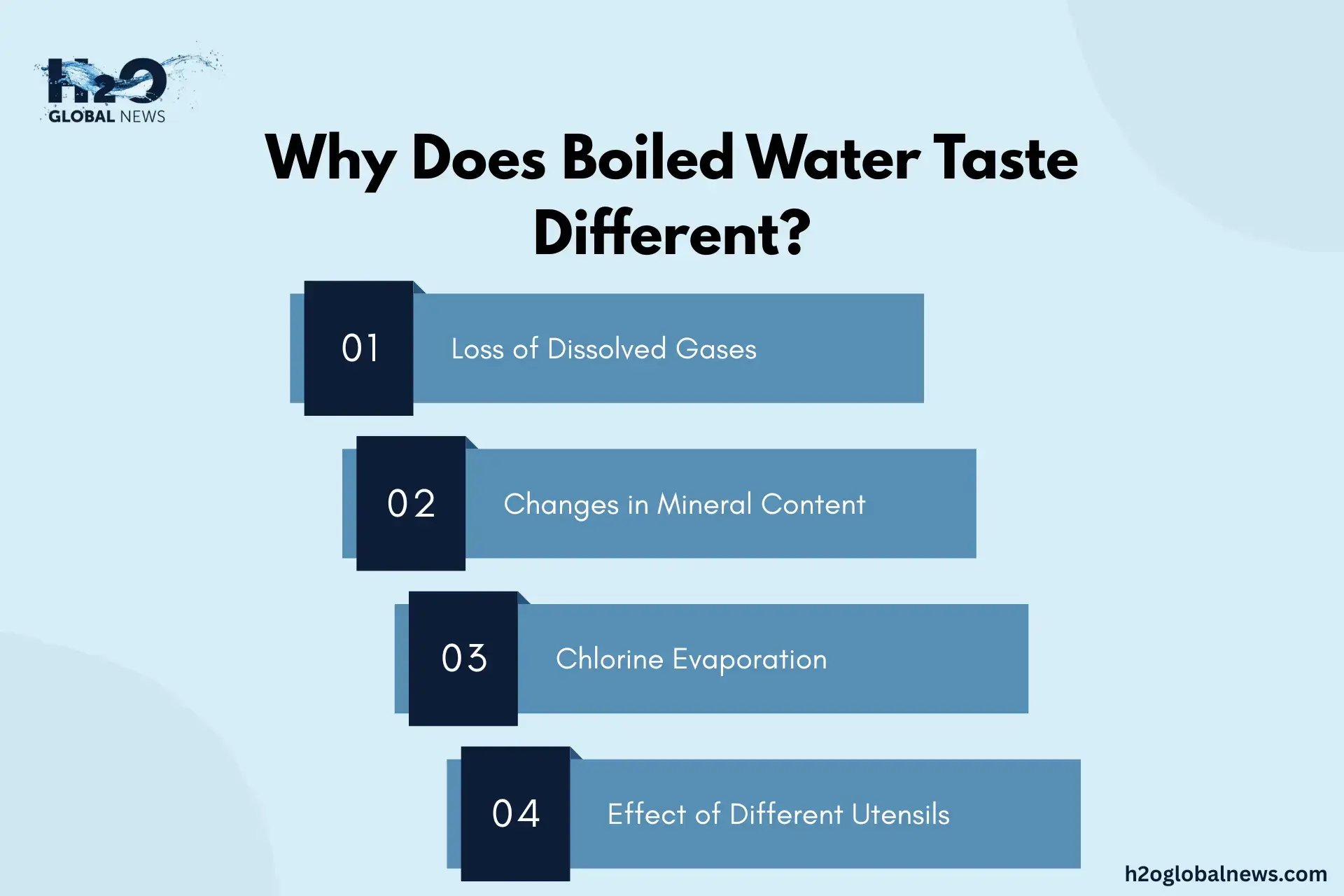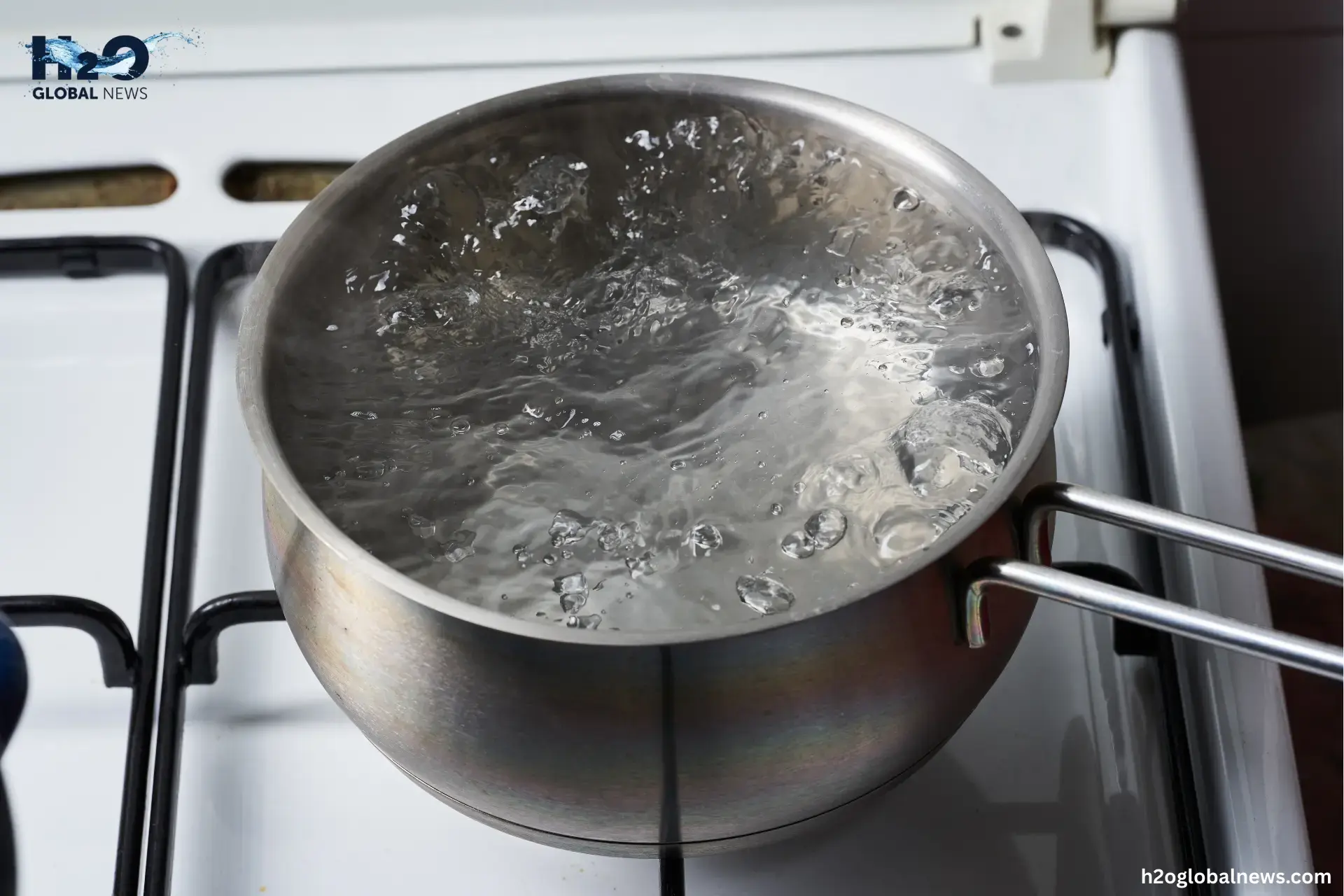Boiling water is often done to make it safe, especially when you’re unsure about the quality of tap water. But many people believe that boiling water can remove all the minerals from it, which is why it tastes different. So, let’s discuss the real reasons why boiled water tastes different and whether it’s still safe to drink.
Why Does Boiled Water Taste Different?
There are a few simple reasons why boiled water tastes different compared to fresh tap water. Here are the reasons behind it:
1- Loss of Dissolved Gases
Tap water contains tiny amounts of gases like oxygen and carbon dioxide, which contribute to its fresh taste. When you boil water, these gases escape into the air, and the water can taste flat. Fresh tap water usually contains around 8 mg/L of dissolved oxygen. After boiling, that level can drop close to zero.
2- Changes in Mineral Content
Tap water often contains naturally occurring minerals like calcium and magnesium, especially in hard water areas. When you boil water, some of it evaporates, concentrating the remaining minerals. This can slightly change the taste of water. In some cases, you might even notice white flakes or residue after boiling.
3- Chlorine Evaporation
Most municipal water systems use chlorine to kill bacteria and keep the water safe. When you boil tap water, chlorine is released into the air, changing the taste. This can make the water tasteless, which some people prefer, while others find it flat. In the UK, chlorine is typically added at around 0.5 mg/L, but boiling removes most of it.
Boiled water can taste flat due to the loss of oxygen and gases, but interestingly, some people find that water has a slightly sweet taste. This sweetness comes from the minerals dissolved in the water, which can change how we perceive its flavor.
4- Effect of Different Utensils
The pot or kettle you use to boil water can also affect how the boiled water tastes. Some metal kettles or pots (especially older ones or those made of low-quality materials) can leach tiny amounts of metal into the water. This doesn’t usually cause harm, but can slightly change the taste. Also, boiling water in cheap plastic kettles may add a plastic-like odor or taste, especially when the kettle is new.
Does the Kettle or Pot You Use Affect the Taste?
Yes, the material and cleanliness of your kettle or pot can impact how boiled water tastes.
-
Metal kettles (especially older or lower-quality ones) can slightly leach metal ions if the water is acidic or the surface is scratched. This may result in a metallic or bitter aftertaste.
-
Plastic kettles sometimes give water a “plastic-like” flavor, especially when new or if boiling occurs repeatedly.
-
Limescale buildup inside electric kettles can also change the taste by introducing extra calcium or magnesium into the water.
Is Boiled Water Safe to Drink?
Yes, it is safe to drink. Boiling water can kill bacteria, viruses, parasites, and other harmful microorganisms. In fact, boiling is one of the oldest and safest ways to purify water. If you’re in an area with low water quality (like while travelling), boiling water is one of the best ways to ensure its safety.
During the 2000 Walkerton, Ontario water crisis, bacterial contamination caused widespread illness. Public health officials instructed residents to boil their water, which successfully helped reduce the spread of infections.
But be careful if your water contains heavy metals (like lead), boiling won’t remove those. It can even concentrate them if you boil for too long. Moreover, Boiling doesn’t eliminate chemical pollutants like pesticides or industrial waste. In these cases, it’s better to filter your water first and then boil it.
How Do You Make Boiled Water Taste Better?
According to the CDC, after boiling, let the water cool and pour it back and forth between two clean containers several times. This helps add oxygen back into the water, which improves the water’s taste and makes it feel fresher. This process is called aeration.
Cold water tastes fresher. Once your boiled water cools, place it in the fridge for a few hours. To give your boiled water a natural flavor, add a thin slice of lemon, cucumber, or mint leaves after it cools.
FAQs
What Temp does Water Boil?
Water boils at 100°C (212°F) at sea level. However, the boiling point can change depending on altitude; higher places have a lower boiling point.
Can Boiling Water kill Bacteria?
Yes, boiling water can kill most bacteria. Bringing water to a rolling boil for at least one minute (or three minutes at higher altitudes) effectively disinfect it by destroying bacteria, viruses, and parasites that may cause illness.
Is Boiling Water better than using a Water Purifier?
Boiling is excellent for killing germs, but water purifiers can remove both biological contaminants and chemicals. A combination of both offers the best protection.
Can I store boiled water for later use?
Yes, store boiled water in a clean, covered container and use it within 24–48 hours. Keep it in a cool place to prevent recontamination.
Conclusion
Boiling water tastes different because it removes natural gases like oxygen and carbon dioxide, which help give water its fresh flavor. While some people think boiling takes away all minerals, that’s not true; most minerals stay in the water. However, it may not always taste better, but it’s definitely safe to drink and even recommended if your tap is contaminated. Whether you’re boiling water for safety or out of habit, remember that the change in water taste is normal.









